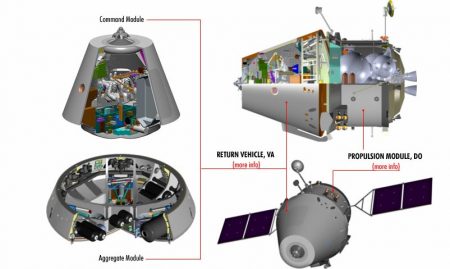July 22, 2018 – Russia’s human crewed space program is soon going to be looking for new passengers for its Soyuz command modules which currently operate as an Earth to the International Space Station (ISS) taxi service. Although SpaceX and Boeing are still going through NASA’s rigorous testing of their commercial crew capsules, the window is closing for American astronauts hitching rides with Russia. In 2019 then, Russia will have to rethink its human spaceflight program. Part of that rethink is to repurpose Soyuz for future lunar activity while introducing a new command module called Federatsiya to be used for launching human crews into space.
Federatsiya will be designed so that it can be launched on the existing Soyuz-5 rocket, Russia’s most reliable booster. Eventually, the plan is to build a much more powerful launch rocket in the mold of the American Saturn and Space Launch System. But Roscosmos is budget challenged and years away from delivering a next-generation booster.
For the moment the space agency has committed almost 58 billion rubles (under a billion U.S. dollars) to the Federatsiya spacecraft. The prime contractor is RKK Energia, the company most associated with Russia’s human spaceflight efforts. The contract which was awarded back in 2016 is still several years from the completion of construction of a first Federatsiya but recently Russia’s President, Vladimir Putin, has stated he would like to see the timetable for the build compressed so that a launch of the Soyuz replacement happens before 2020. That timeline is highly unlikely if the Russians hope to succeed with the project. We are probably looking at the earliest a 2022 date before all the bugs in this new Soyuz replacement make it spaceworthy. That means the window to compete with SpaceX and Boeing will be gone.
How does Russia then want to use its next-generation spacecraft?
The plan is for Federatsiya to do both low-Earth orbit and lunar missions. Specifications include room for a crew of four, and a capability of autonomous flight for up to 10 days, about the time needed to get from Earth to the Moon and back. Putin has given his blessing to a lunar program to send cosmonauts there and back by 2030. The plan is to build a space station (akin to NASA’s Lunar Gateway) to orbit the Moon and then descent and ascent spacecraft along with lunar habitation modules to establish a permanent lunar presence. But they won’t be able to do this without a heavy launch capability which is currently lacking. Talks with China have led to speculation that Russia could work with the former in a joint project built around heavy launch capacity.
Meanwhile, what are the Russians to do with Soyuz? In June of this year, Roscosmos’ head, Dmitry Rogozin, speculated that Soyuz could be adapted to take humans to the Moon. This would be for lunar flyby missions, space tourism so to speak. But Soyuz’cramped quarters would make that kind of voyage awfully uncomfortable for its human occupants. Instead, more likely a better use for this 50-year-old design would be to turn it into a lunar taxi. If this is indeed in the plans Soyuz would need to be mated to a landing and ascent module. It cannot land on the Moon the way it does today on Earth using a parachute and last-second rocket firing.
Russia’s ambitions may far exceed the country’s grasp with Federatsiya following the same course as the ill-fated Buran, the Soviet equivalent to the U.S. Space Shuttle, a program that succumbed to the geopolitical and economic storm that ended with the dismantling of the USSR.
















